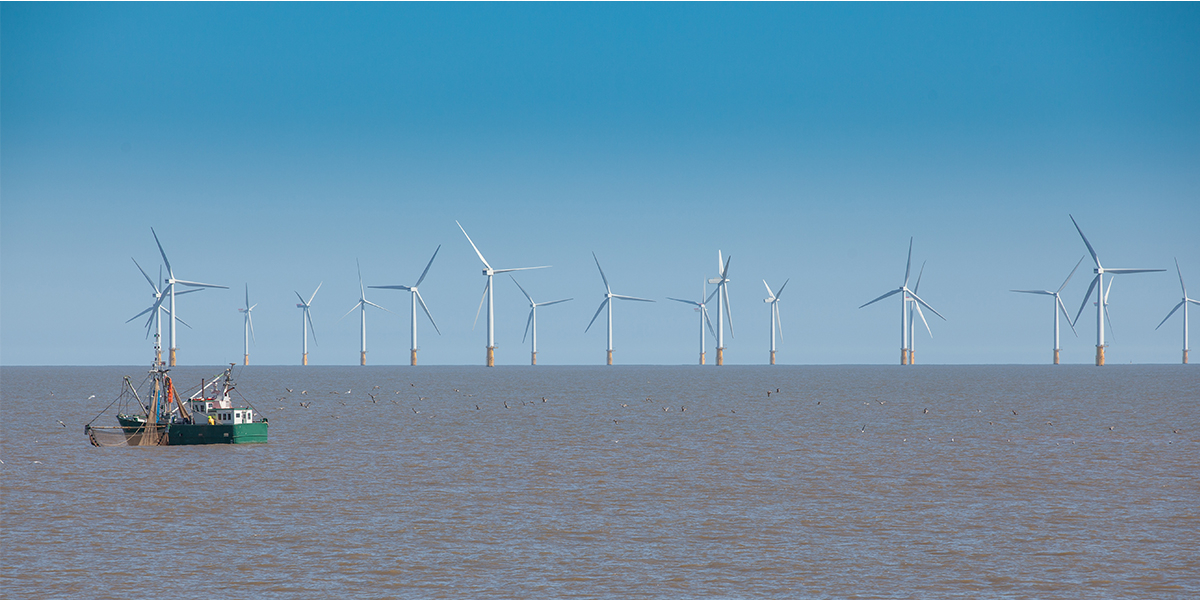’North Sea Transition in Harmony’ connects indispensable stakeholders
In the proposed six-year ‘Blue Route’ research programme, scientists, companies, NGOs and ministries are involved. “That is highly essential”, says biological oceanographer Myron Peck of the NIOZ. “The pressure on the North Sea will only grow. Several factors are of interest: shellfish and other aquaculture activities, nature protection and the generation of sustainable energy. In 2023, for example, 4.5 GigaWatts of wind energy are generated, however in 2030 this will probably have grown to 11.5 GigaWatts. Next to that, floating solar panels could potentially yield 226 GigaWatts of solar energy in the Dutch part of the North Sea. There will be consequences for the fisheries sector and nature protection. For example, 30% of all historical fishery areas are closed to develop new wind farms.”

Social-ecological change scenarios
Until now, the competition for space made it impossible to get all the parties around the table that are involved in the transitions for energy, fishery and nature. The participants in ‘North Sea Transition in Harmony’, however, now did succeed. Ecologists, economists, engineers, sociologists and legal scholars want to cooperate with stakeholders to formulate social-ecological change scenarios with risks and chances for the three sectors during the next decennia.
Peck: “Cooperating with stakeholders enables us to deliver risk analyses that are suitable for the individual sectors and policymakers. With that trans-disciplinary approach, we are connecting science to society. Via blue growth, we want to create a sustainable North Sea that offers human welfare to coastal communities and the Dutch society.” Peck is happy with the support of the ministries of Fisheries and of Infrastructure and Water Management. “We have buy-in from the policymakers that will help steer future developments in the Dutch North Sea region.”
Multisectoral vision is essential
“The sectors energy, fishery and nature conservation all have a very sectoral vision of what the North Sea should look like. That leads to conflict” says Simon Bush, Professor of environmental policy at Wageningen University & Research (WUR). “The Dutch part of the North Sea is probably one of the most intensively used seas in the world. You need to have regulation, but also a shared vision. Not several sectoral visions, but one multisectoral vision that enable all three transitions simultaneously.”
The research consortium hopes to strengthen the relationships between the sectors, create a shared vision on spatial planning and stimulate innovation in policy and practice. This will have to happen in several work packages, each with their own focus. The aim is to develop tools and measurements for various questions related to spatial planning, implementing and managing sustainable solutions, using smart financial instruments and legal mitigation of judicial problems.
Generate impact through stakeholder engagement
The work package ‘Stakeholder engagement’ is of great importance for the success of the research project. Marine ecologist Serena Rivero from the North Sea Foundation is coordinating this part of the project. “This research is solution-oriented: it wants to provide chances and map the risks. Not only is that important for nature conservation, it is also essential for fisheries to take part in the transition to sustainable food production, as it enables them to keep on fishing. Plus, for them, the transition is also a cultural one.”
According to Rivero, the North Sea Transition in Harmony research project enables changes to happen through a science-based cooperation. “This is exactly what we as a social organization aim for. For us, application is important and we hope to help convert the scientific results into policy. Stakeholder engagement enables you to generate impact.”
Start of international coordination
The researchers will also strengthen their cooperation with other countries around the North Sea. Peck: “Spatial planning in the sea is not well coordinated among countries, even though the way countries use their piece of the North Sea will indeed influence other parts. Moreover, the various countries have the same goals of preserving biodiversity while enabling seafood production and providing renewable energy. We are, therefore, in close contact with scientists in the countries surrounding the North Sea who advise us on their national policies and activities. This research programme, therefore, can greatly strengthen coordination among countries that rely on the North Sea.”
Under review by NWO
At this moment, the research proposal is under review by NWO (the Dutch Research Council) as part of the NWA (Dutch Research Agenda) call ‘Research through Routes by Consortia’. Peck underlines the relevance of this project. “This new research consortium offers a unique framework for governments, companies and NGOs to cooperate. We want to build a structure for parties to communicate with each other. Only then can the sustainable spatial planning of the North Sea be made a success.”